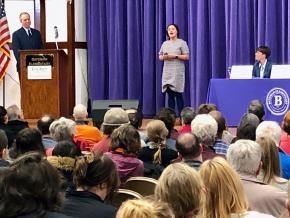Debating the future of Chicago’s 33rd Ward
reports from Chicago on a debate of candidates running for City Council, where Rossana Rodriguez is campaigning on a program of social justice.
ROSSANA RODRIGUEZ-Sanchez, the educator and activist running for City Council against Chicago machine Democrat Deb Mell in the city’s 33rd Ward, projected her vision for more equitable neighborhoods at an aldermanic forum in Albany Park on February 7.
In front of a crowd of 200 at a local elementary school auditorium, Rodriguez foregrounded her experience as an activist and her plan to promote wide and deep resident participation in ward politics, from public debate over budget and zoning decisions to tenant advocacy and immigrant defense.
Throughout the evening, she made clear that effectively addressing these issues doesn’t begin or end with the election.
Rodriguez, who is endorsed by the independent political organization 33rd Ward Working Families (33WF), presents the most serious electoral challenge to the well-connected and deep-pocketed Mell family dynasty that has ruled the ward for over four decades.

After participating in high school teacher Tim Meegan’s challenge of Mell in 2015 — one that came just 17 votes shy of forcing a runoff — Rodriguez and several other campaign members started 33WF. From the announcement of her candidacy last summer, Rodriguez has faced an uphill battle.
Mell began her campaign with 10 times more funding, including $50,000 from Chicago Forward, a super PAC affiliated with outgoing Chicago Mayor Rahm Emanuel.
THE FORUM was planned by a group of community organizations and was moderated by Chicago Tribune columnist Eric Zorn. Questions were collected and selected by the convening community organizations in advance, and candidates answered questions relating to housing affordability, homelessness, economic development and policing.
Over the course of the forum, a context in which candidates are often expected to be self-aggrandizing, Rodriguez consistently situated herself within a constellation of activists, teachers and students that have driven and enabled her activism since arriving in Chicago.
She spoke candidly of her move to Chicago from Puerto Rico in 2009, after the governor announced an economic “state of emergency”, under which laid-off 17,000 public-sector workers.
Differences in life experience between the candidates were very apparent over the course of the forum. When asked how she would prevent corruption in City Hall, Mell suggested limiting conflicts of interest by ensuring that “alderman have only one job. Like I have only had one job in my life, and that’s public service.”
Mell’s lifelong political career — including the inheritance of her aldermanic seat from her father Dick Mell — have insulated her from the pressures and concerns of working-class and low-income people.
By contrast, Rodriguez eagerly shared how her personal history — from packing courtrooms in support of ICE detainees to her own difficulties finding affordable housing — informed her political positions.
Since being nominated by 33WF to run for the City Council seat, Rodriguez has continued working on the ground with many of the issue groups that inform her platform. Just two days before the forum, she was on the picket line with teachers striking at the Chicago International Charter Schools.
The rules of the forum stipulated no engagement between candidates. This prevented Rodriguez from challenging the veracity of Mell’s claims and allowed the incumbent to present herself as a longtime champion of progressive policies, rather than a Democratic Party machine politician who has only recently attempted to water down her pro-development, pro-police views.
In response to the opening question on gentrification, Mell insisted that the ward “find the right balance between attracting new folks and new businesses and making sure that people can afford to live here.”
Beholden to real estate interests that donate to her campaign and yet eager to capitalize on the notion that housing is a human right, Mell could do little more but equivocate on several key questions.
Nowhere was Mell’s pernicious ambiguity more apparent than in her discussion of the police. She led off by calling for a “holistic” approach to crime, but made no attempt to explain what this buzzword might mean it terms of real reparative social services.
She then added that she has consistently advocated for a “well-funded, well-trained and accountable” police force, knowing that the businesses and wealthy homeowners that she represents would accept nothing else than deference to the Chicago Police Department and its swollen budget.
RODRIGUEZ’S MOST powerful statement of the evening was a story she told about her students at an alternative school in Humboldt Park, many of whom were gang-affiliated because “they didn’t get early intervention and they didn’t get special education services.”
By refusing to peddle myths about gang members and by drawing on her own experience working with young people, Rodriguez unapologetically called for violence-prevention solutions beyond “bringing more police into our communities.” Her insistence that “we cannot give any more to the police” elicited the only applause break of the evening.
Rodriguez was similarly uncompromising in her closing statements. In case anyone in the audience had any doubt as to what her tenure as alderman would mean, she explained that she would work to institute “rent control, public health approaches to safety, sanctuary for our undocumented brothers and sisters and fully funded neighborhood schools and mental health services.”
And for those who would cynically ask how exactly all these necessities would be paid for, she offered this: by “taking back the resources that belong to us, that this city has in abundance.”
Although the impact of the forum on voter attitudes is difficult to gauge, Rodriguez was clear on what it will take to seriously address problems on Chicago’s Northwest Side and beyond. The coalition that has formed around the Rodriguez campaign looks like it will persist long after the election, and her assertion that “budgets are moral documents” will echo ever louder throughout Chicago’s political discourse.


